Abstract
The current discourse on competency-based medical education (CBME) is confounded by a lack of agreement on definitions and philosophical assumptions. This phenomenon impacts curriculum implementation, program evaluation and disrupts dialogue with the education community. The purpose of this study is to explore how Canadian key opinion leaders describe the philosophy and practice of CBME. A purposeful and snowball sample of Canadian key opinion leaders, reflecting diversity of institutions and academic roles, was recruited. A qualitative thematic analysis of semi-structured interviews was conducted using the principles of constructivist grounded theory. A modified integrated knowledge user checking process was accomplished via a national open meeting of educators, researchers, and leaders in postgraduate medical education. Research ethics board approval was received. 17 interviews were completed between September and November 2018. 43 participants attended the open meeting. There was no unified framing or definition of CBME; perspectives were heterogenous. Most participants struggled to identify a philosophy or theory that underpinned CBME. CBME was often defined by key operational practices, including an emphasis on work-based assessments and coaching relationships between learners and supervisors. CBME was articulated as addressing problems with current training models, including failure to fail, rigor in the structure of training and maintaining the social contract with the public. The unintended consequences of CBME included a reductionist framing of competence and concern for resident wellness with changes to the learning environment. This study demonstrates a heterogeneity in defining CMBE among Canadian key opinion leaders. Future work should explore the fidelity of implementation of CBME.
Similar content being viewed by others
References
Albanese, M., Mejicano, G., & Gruppen, L. (2008). Perspective: Competency-based medical education: A defense against the four horsemen of the medical education apocalypse. Academic Medicine, 83(12), 1132–1139
Boyd, V. A., Whitehead, C. R., Thille, P., Ginsburg, S., Brydges, R., & Kuper, A. (2018). Competency-based medical education: the discourse of infallibility. Medical education, 52(1), 45–57
Brydges, R., Boyd, V., Tavares, W., Ginsburg, S., Kuper, A., Anderson, M., & Stroud, L. (2020). Assumptions about competency-based medical education and the state of the underlying evidence: A critical narrative review. Academic Medicine, 96(2), 296–306
Canadian Institutes of Health Research. (2021). Guide to Knowledge Translation Planning at CIHR: Integrated and End-of-Grant Approaches. Retrieved February 11, 2021, from https://cihr-irsc.gc.ca/e/45321.html#a3.
Charmaz, K. (2000). Grounded theory: Objectivist and constructivist methods. In N. K. Denzin & Y. S. Lincoln (Eds.), Handbook of qualitative research. (pp. 509–535). Sage Publications Inc.
Chartmaz, K. (2006). Constructing grounded theory: a practical guide through qualitative analysis. Sage.
CFIR Research Team-Centre for Clinical Management Research. (2021). Consolidated Framework for Implementation Research. Retrieved February 11, 2021, from https://cfirguide.org/.
Cristancho, S. (2014). What can we learn from a soft sister? A complementary lens to the systems engineering approach in medical education research. Medical education, 48(12), 1139
Ellaway, R. H., Mackay, M. P., Lee, S., Hofmeister, M., Malin, G., Archibald, D., Lawrence, K., Dogba, J., Côté, L., & Ross, S. (2018). The impact of a national competency-based medical education initiative in family medicine. Academic Medicine, 93(12), 1850–1857
Englander, R., Frank, J. R., Carraccio, C., Sherbino, J., Ross, S., Snell, L., & Collaborators, I. C. B. M. E. (2017). Toward a shared language for competency-based medical education. Medical teacher, 39(6), 582–587
Eva, K. W. (2017). What’s in a name? Definitional clarity and its unintended consequences. Medical education, 51(1), 1–2
Flexner, A. (1910). Medical education in the United States and Canada: A report to the Carnegie Foundation for the Advancement of Teaching. Carnegie Foundation for the Advancement of Teaching.
Frank, J. R., Snell, L. S., Cate, O. T., Holmboe, E. S., Carraccio, C., Swing, S. R., Harris, P., Glasgow, N. J., Campbell, C., Dath, D., & Harden, R. M. (2010). Competency-based medical education: Theory to practice. Medical Teacher, 32(8), 638–645
Frank, J. R., Snell, L. S., & Sherbino, J. (2017). CanMEDS 2015 physician competency framework. Royal College of Physicians and Surgeons of Canada.
Goldhamer, M. E. J., Pusic, M. V., Co, J. P. T., & Weinstein, D. F. (2020). Can covid catalyze an educational transformation? Competency-based advancement in a crisis. New England Journal of Medicine, 383, 1003–1005
Harden, R. M. (1999). AMEE Guide No. 14: Outcome-based education: Part 1—An introduction to outcome-based education. Medical Teacher, 21(1), 7–14
Hawkins, R. E., Welcher, C. M., Holmboe, E. S., Kirk, L. M., Norcini, J. J., Simons, K. B., & Skochelak, S. E. (2015). Implementation of competency-based medical education: are we addressing the concerns and challenges? Medical Education, 49(11), 1086–1102
Hennink, M. M., Kaiser, B. N., & Marconi, V. C. (2017). Code saturation versus meaning saturation: how many interviews are enough? Qualitative health research, 27(4), 591–608
Holmboe, E. S., Edgar, L., & Hamstra, S. (2016). The milestones guidebook. Accreditation Council for Graduate Medical Education.
Holmboe, E. S., Sherbino, J., Englander, R., Snell, L., Frank, J. R., & Collaborators, I. C. B. M. E. (2017). A call to action: The controversy of and rationale for competency-based medical education. Medical teacher, 39(6), 574–581
Keith, R. E., Hopp, F. P., Subramanian, U., Wiitala, W., & Lowery, J. C. (2010). Fidelity of implementation: Development and testing of a measure. Implementation Science, 5(1), 1–11
Lingard, L., & Hodges, B. D. (2012). The question of competence. Cornell University Press.
Lochnan, H., Kitto, S., Danilovich, N., Viner, G., Walsh, A., Oandasan, I. F., & Hendry, P. (2020). Conceptualization of competency-based medical education terminology in family medicine postgraduate medical education and continuing professional development: A scoping review. Academic Medicine, 95(7), 1106–1119
McGaghie, W. C., Miller, G. E., Sajid, A., & Telder, T. V. (1978). Competency-based curriculum development in medical education: An introduction. World Health Organization.
Mills, J. A., Middleton, J. W., Schafer, A., Fitzpatrick, S., Short, S., & Cieza, A. (2020). Proposing a re-conceptualisation of competency framework terminology for health: A scoping review. Human Resources for Health, 18(1), 1–16
Morcke, A. M., Dornan, T., & Eika, B. (2013). Outcome (competency) based education: An exploration of its origins, theoretical basis, and empirical evidence. Advances in Health Sciences Education, 18(4), 851–863
Nguyen, Q. D., Fernandez, N., Karsenti, T., & Charlin, B. (2014). What is reflection? A conceptual analysis of major definitions and a proposal of a five-component model. Medical education, 48(12), 1176–1189
Norman, G., Norcini, J., & Bordage, G. (2014). Competency-based education: milestones or millstones. Journal of Graduate Medical Education, 6(1), 1–6
O’Donnell, C. L. (2008). Defining, conceptualizing, and measuring fidelity of implementation and its relationship to outcomes in K–12 curriculum intervention research. Review of educational research, 78(1), 33–84
Royal College of Physicians and Surgeons of Canada. (2020). Competency by Design. Retrieved September 18, 2020, from http://www.royalcollege.ca/rcsite/cbd/competence-by-design-cbd-e.
Schmidt, H. G. (1993). Foundations of problem-based learning: some explanatory notes. Medical Education, 27(5), 422–432
Starmer, A. J., O’Toole, J. K., Rosenbluth, G., Calaman, S., Balmer, D., West, D. C., Bale, J. F., Jr., Yu, C. E., Noble, E. L., Tse, L. L., Srivastava, R., Landrigan, C. P., Sectish, T. C., Spector, N. D., & I-PASS Study Education Executive Committee. (2014). Development, implementation, and dissemination of the I-PASS handoff curriculum: A multisite educational intervention to improve patient handoffs. Academic Medicine, 89(6), 876–884
Stalmeijer, R. E., McNaughton, N., & Van Mook, W. N. (2014). Using focus groups in medical education research: AMEE Guide No. 91. Medical Teacher, 36(11), 923–939
Talbot, M. (2004). Monkey see, monkey do: A critique of the competency model in graduate medical education. Medical Education, 38(6), 587–592
Van Melle, E., Frank, J. R., Holmboe, E. S., Dagnone, D., Stockley, D., Sherbino, J., & International Competency-based Medical Education Collaborators. (2019). A core components framework for evaluating implementation of competency-based medical education programs. Academic Medicine, 94(7), 1002–1009
van Mook, W. N., van Luijk, S. J., O’Sullivan, H., Wass, V., Zwaveling, J. H., Schuwirth, L. W., & van der Vleuten, C. P. (2009). The concepts of professionalism and professional behaviour: conflicts in both definition and learning outcomes. European Journal of Internal Medicine, 20(4), e85–e89
Walsh, K., & Eva, K. W. (2013). When I use a word, it means just what I choose it to mean–neither more nor less. Medical education, 47(9), 856–857
Whitehead, C. R., & Kuper, A. (2017). Faith-based medical education. Advances in Health Sciences Education, 22(1), 1–3
Wong, B. M., & Headrick, L. A. (2020). Application of continuous quality improvement to medical education. Medical Education, 55, 72–81
Young, M., Thomas, A., Gordon, D., Gruppen, L., Lubarsky, S., Rencic, J., Ballard, T., Holmboe, E., Da Silva, A., Ratcliffe, T., & Schuwirth, L. (2019). The terminology of clinical reasoning in health professions education: Implications and considerations. Medical Teacher, 41(11), 1277–1284
Acknowledgements
Dr. Ginsburg holds a Canada Research Chair in Health Professions Education.
Author information
Authors and Affiliations
Corresponding author
Additional information
Publisher's Note
Springer Nature remains neutral with regard to jurisdictional claims in published maps and institutional affiliations.
Appendix: Interview guide
Appendix: Interview guide
CBME is a term that often gets used (and misused) in many ways. We are interested in your understanding of CBME, specific to the Canadian medical education context. In the next half hour, you will talk about three themes: the philosophies, principles and practices related to CBME.
Question 1: PHILOSOPHY
I am going to start by asking about your philosophy of CBME. By philosophy, I mean theory or conceptual framework.
-
What do you believe are the philosophies that should inform CBME?
-
Does your description align with what the philosophies that inform CBME curricula as developed by the Royal College or CFPC? In what ways does it differ, if at all?
-
What are the core problems with the traditional medical education system that CBME is trying to solve?
-
Do the philosophies that support Royal College or CFPC CBME curricula align with the problems they are trying to solve?
-
Can you describe alternative educational philosophies that may better address the problems in our traditional education system?
-
Why do you think they would be better?
-
-
Question 2: Principle
Now let’s talk about principles of CBME. When I refer to the principles, I mean the core components of CBME or the link between the philosophy and its application (i.e., practice). For example, a principle of PBL is self-guided study connecting the philosophy of learning by discovery with the practice of small group tutorials.
-
What are the key principles underlying or supporting your philosophy of CBME?
-
What principles do you think are currently missing in the current model of CBME?
-
Are there assumptions built into these principles that make them susceptible to failure (e.g., sociological, cognitive and learning traits of humans)
Question 3: Practice
Finally, let’s talk about the practices that inform CBME. When I say practice, I am referring to the application or use of an idea or belief. How does an organization operationalize / make CBME principles work.
-
If CBME principles were poorly enacted, what bad set of education practices would you see?
-
Across learners, preceptors, and administrators?
-
-
Recognizing that CBME will be implemented in different contexts and learning environments, what do the ideal set of practices like look? (By ideal I mean unlimited budget, no operational constraints.)
Question 4: SNOWBALL
Who else would you recommend I interview? Who are thought leaders in the design and/or scholarship of CBME?
Question 5: CONCLUSION
Lastly, is there anything else you want to share with me?
Rights and permissions
About this article
Cite this article
Sherbino, J., Regehr, G., Dore, K. et al. Tensions in describing competency-based medical education: a study of Canadian key opinion leaders. Adv in Health Sci Educ 26, 1277–1289 (2021). https://doi.org/10.1007/s10459-021-10049-8
Received:
Accepted:
Published:
Issue Date:
DOI: https://doi.org/10.1007/s10459-021-10049-8




